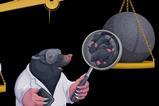Emily Seeber recommends approaches that build students’ understanding of their practical work over time, and quick wins that could boost their ability to recall practical knowledge before exams

We often bemoan students’ lack of understanding of their practical work. To tackle this we need to build understanding explicitly and consistently into practical teaching. The focus on practical skills in the ‘new’ GCSE exams also means those teaching this need to give students the means to approach practical-based questions. There are quick ways to boost students’ confidence and approaches that build their skills across a two or three year course.
Compare and contrast practical methods
Students can feel they are drowning in the different practicals they have done for various purposes throughout their course. Supporting students to bring together all of the related methods, and summarise their pros, cons and quirks really builds confidence.
List different methods for, say, measuring rate of reaction. Ask students to complete an apparatus diagram, explain how the method works, and list pros and cons for each method. I usually model the first one on the board, have students help me with the second and third, and then let them get on with the rest in pairs. This activity gives an opportunity to remind them why you put cotton wool in the neck of the flask when measuring rate by mass loss, why you shouldn’t collect carbon dioxide over water, and why mass loss shouldn’t be used to measure rate if hydrogen is produced. Students also finish with a clear, succinct summary sheet, which they can revise from directly.
Download this worksheet containing methods for measuring the rate of a reaction with a grid for students to complete with more details (MS Word or pdf).
Plan practicals
There is a view that students don’t have the required background knowledge to plan practicals. In chemistry, some argue that letting students plan is too dangerous, and takes too much lesson time. I disagree. Of course students won’t develop the knowledge required for planning if we never get them to plan. Students can learn to assess risks and teachers should check their plans. In my experience, students learn such a vast amount when supported to plan investigations that it’s worth any time it takes.
To support students with their planning, I recommend assessment grids so they know what a strong plan looks like. To get the most out of these, students first need to learn how to evaluate a plan. I provide students with an imperfect plan for investigating the relationship between the size of marble chips and the rate of reaction with hydrochloric acid, and ask them to mark it using an assessment grid provided, and suggest improvements. I then give them a different assessment grid and ask them to plan an investigation into how different catalysts affect the rate of decomposition of hydrogen peroxide: it’s amazing how good their plans are.
Download this assessment grid for planning an investigation into the rate of a reaction (MS Word or pdf) and this assessment grid for planning an investigation in the rate of a catalysed reaction (MS Word or pdf).
Design questions
The thought process that goes into designing questions is a pathway to subject mastery. It’s also a great way of differentiating, as students tend to design the most conceptually challenging questions they can; the highest achievers love getting creative and designing devilish questions.
Students get better at inventing questions over time, and if this approach is planned into the curriculum, you can increase the cognitive challenge in stages. The first time a group writes practical-based questions, you might give them the method and data, and ask students to design a question using them, which may involve graph plotting. The second time, they could use data from their own practical to write the question. The third time, planning a method for the practical might be part of their brief for writing the question. By the end of their GCSE, students know the experiments well enough to make up their own data, and recall the details of specific practicals as they include them in their questions.
I think designing exam questions is so useful for students it can be a good ‘quick win’ as well, even if they aren’t practiced at it. Choose a practical they struggle with, show them a YouTube video of it, give them any data they need, and task them with designing a 10 mark question and a mark scheme. Setting a specific number of marks makes students think harder. Once you’ve checked the questions, they can answer each other’s. Best of all, this takes minimal teacher preparation and means maximal student learning.
Great practical teaching should focus on the slow burners, the strong pedagogical approaches. But if throwing in some quick wins along the way builds students’ confidence (and exam results), that’s a bonus.
Emily Seeber is a chemistry teacher and head of sciences at Bedales School in Hampshire.
Downloads
Comparing methods: measuring reaction rate worksheet
Word, Size 54.99 kbComparing methods: measuring reaction rate worksheet
PDF, Size 51.93 kbPlanning an investigation: reaction rate assessment grid
Word, Size 54.57 kbPlanning an investigation: reaction rate assessment grid
PDF, Size 55.68 kbPlanning an investigation: catalysed reaction rate assessment grid
Word, Size 54.9 kbPlanning an investigation: catalysed reaction rate assessment grid
PDF, Size 56.15 kb














No comments yet